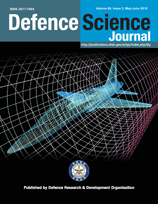Profile-based Maximum Penalised Likelihood Trajectory Estimation from Space-borne LOS Measurements
DOI:
https://doi.org/10.14429/dsj.66.9226Keywords:
Trajectory estimation, poor-observability, pseudo-measurements, Likelihood estimatorAbstract
Estimating the boost-phase trajectory of a ballistic missile using line of sight measurements from space-borne passive sensors is an important issue in missile defense. A well-known difficulty of this issue is the poor-observability of the target motion. A profile-based maximum penalised likelihood estimator is presented, which is expected to work in poor-observability scenarios. Firstly, a more adaptable boost-phase profile is proposed by introducing unknown parameters. Then, the estimator is given based on the Bayesian paradigm. After that, a special penalty for box constraint is constructed based on a mixed distribution. Numerical results for some typical scenarios and sensitivity with respect to a priori information are reported to show that the proposed estimator is promising.Downloads
Published
2016-04-25
How to Cite
Yi, T., Shen, Z., Wang, Z., Liu, B., & Yi, D. (2016). Profile-based Maximum Penalised Likelihood Trajectory Estimation from Space-borne LOS Measurements. Defence Science Journal, 66(3), 278–286. https://doi.org/10.14429/dsj.66.9226
Issue
Section
Missile Systems
License
 Where otherwise noted, the Articles on this site are licensed under Creative Commons License: CC Attribution-Noncommercial-No Derivative Works 2.5 India
Where otherwise noted, the Articles on this site are licensed under Creative Commons License: CC Attribution-Noncommercial-No Derivative Works 2.5 India


